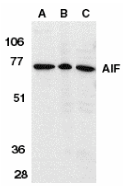Catalog# : 2267
Apoptosis is characterized by several morphological nuclear changes including chromatin condensation and nuclear fragmentation. These changes are triggered by the activation of members of caspase family, caspase activated DNase, and several novel proteins (1). A novel gene, the product of which causes chromatin condensation and DNA fragmentation, was recently identified, cloned, and designated apoptosis inducing factor (AIF) (2). Like the critical molecules, cytochrome c and caspase-9, in apoptosis, AIF localizes in mitochondria. AIF translocates to the nucleus when apoptosis is induced and induces mitochondria to release the apoptogenic proteins cytochrome c and caspase-9. AIF induces chromatin condensation and large scale DNA fragmentation, which are the hallmarks of apoptosis, of the isolated nucleus and the nucleus in live cells by microinjection and apoptosis stimuli (2,3). AIF is highly conserved between human and mouse and widely expressed (2).
Additional Names : AIF (IN), AIF
 Description
DescriptionLeft: Western blot analysis of AIF in K562 cell lysate (A), rat heart (B), and mouse heart (C) tissue lysates with AIF antibody (IN) at 1 µg/ml. Below: Immunohistochemistry of AIF in human retina with AIF antibody at 10 µg/ml.
Source :AIF antibody was raised against a peptide corresponding to amino acids 517 to 531 of human AIF. This sequence is identical to those of mouse and rat AIF.
Purification : Ion exchange chromatography purified
Clonality and Clone : This is a polyclonal antibody.
Host : AIF antibody was raised in rabbit.
Immunogen : Human AIF (Intermediate Domain) Peptide (Cat. No. 2267P)
Application : AIF antibody can be used d
Tested Application(s) : E, WB, IHC
Buffer : Antibody is supplied in PBS containing 0.02% sodium azide.
Blocking Peptide : Cat. No. 2267P - AIF Peptide
Long-Term Storage : AIF antibody can be stored at 4ºC, stable for one year. As with all antibodies care should be taken to avoid repeated freeze thaw cycles. Antibodies should not be exposed to prolonged high temperatures.
Positive Control
- Cat. No. 1204 - K562 Cell Lysate
- Cat. No. 1461 - Rat Heart Tissue Lysate
- Cat. No. 1401 - Mouse Heart Tissue Lysate
GI Number : 13431764
Accession Number : O95831
Short Description : (IN) Apoptosis Inducing Factor
References
- Zamzami N, Kroemer G. Condensed matter in cell death. Nature 1999;401:127-8
- Susin SA, Lorenzo HK, Zamzami N, et al. Molecular characterization of mitochondrial apoptosis-inducing factor. Nature 1999;397:441-6
- Daugas E, Susin SA, Zamzami N, et al. Mitochondrio-nuclear translocation of AIF in apoptosis and necrosis. FASEB J 2000;14:729-39 (WD0500)

No comments:
Post a Comment